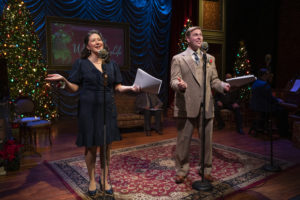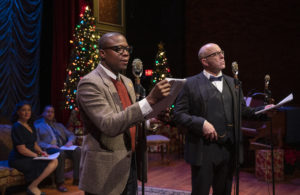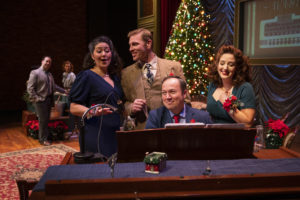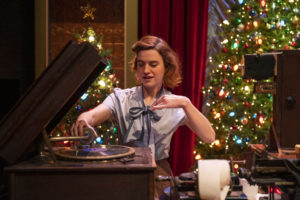
 [rating=5]American Blues Theater has outdone itself in this year’s radio version of the iconic 1946 Frank Capra film “It’s a Wonderful Life.” Entitled “It’s a Wonderful Life: Live in Chicago!”, the show is directed by artistic director Gwendolyn Whiteside and musically directed by ensemble member, pianist, and jingle composer Michael Mahler. It is a well-established holiday classic that takes place before a hypothetical radio audience, who is tuning into station WABT, and we are in the studio audience, watching the cast perform live. The show has been entertaining audiences for the last 21 years. And if you haven’t seen it yet—and even if you’ve seen it before—this unique seasonal treat should not be missed!
[rating=5]American Blues Theater has outdone itself in this year’s radio version of the iconic 1946 Frank Capra film “It’s a Wonderful Life.” Entitled “It’s a Wonderful Life: Live in Chicago!”, the show is directed by artistic director Gwendolyn Whiteside and musically directed by ensemble member, pianist, and jingle composer Michael Mahler. It is a well-established holiday classic that takes place before a hypothetical radio audience, who is tuning into station WABT, and we are in the studio audience, watching the cast perform live. The show has been entertaining audiences for the last 21 years. And if you haven’t seen it yet—and even if you’ve seen it before—this unique seasonal treat should not be missed!
This play with music retells the well-known story of George Bailey (Brandon Dahlquist) and how he comes to appreciate all the people surrounding him who make up his social network. For much of his adult life, George has been tied to the small potatoes institution his father founded, known as The Bailey Building and Loan. But when the supremely greedy and evil Henry F. Potter (Joe Dempsey) absconds with the loan company’s $8,000 bank deposit and George is suddenly short the cash, his thoughts of going bankrupt and being a discredit to his family drive him to thoughts of suicide. And when things go from bad to worse, he gripes: “I wish I had never been born.” George gets that wish fulfilled by an Angel Second Class named Clarence (Joe Dempsey) in a fascinating turn of events, where he gets to relive his life in his hometown of Bedford Falls—but where he no longer exists. It is through this experience that the audience (and eventually George himself) comes to realize that the life of one person can make a huge difference in the world. Had George not lived his life, he could not have saved the life of his brother Harry (Ian Paul Custer), who grew up to save a whole regiment in World War II. Had he not been alive, George could not have married Mary (Audrey Billings) or had his wonderful family life. He would not have been there to stop Mr. Potter from turning Bedford Falls into the hovel of Pottersville, a one-man company town where hard-working citizens must pay usurious rent rather than acquire enough savings to fulfill the American dream of home ownership.
A major feature of the live production is watching actors change their voices at will to play different characters. For example, it’s fun to see Manny Buckley play Uncle Billy one moment and Joseph the next—or to see Dara Cameron play Violet towards the beginning of the show and George’s daughter Zuzu towards the end. This year, however, the increasingly tighter focus on George’s personality makes for an even better play. Additional dialogue brilliantly clarifies the story and allows us to empathize with George’s circumstances all the more. For example, conversations between Joseph and Clarence reveal a bit more narrative about George’s life and also provide somewhat more substance to the characters of Mary and Uncle Billy. Lighting design is much improved from the past. Kudos to the superb work of Katy Peterson Viccellio, who dims the lights and has the spotlight fall on the character of George when he talks to himself about the direction that his life has taken. It is in these moments when George contemplates his place within the universe that the stark lighting emphasizes his angst and fears about the future.
Other elements also make this performance special. When the actors take the stage before the audience enters, we immediately notice their beautifully designed costumes. Kudos to Christopher J. Neville, who used traditional patterns from the 1940s to create such an authentic look. Scenic designer Grant Sabin and set dressing and properties manager Elyse Dolan have together created a traditional holiday-decorated living room, circa 1944, filled with Christmas trees, holiday lights, and vintage furniture. The room prominently features standing microphones, a piano on stage left, and foley equipment on stage right, all for the purpose of generating this fictional radio broadcast. A major change in the cast in the inclusion of a new foley artist J.G. Smith, who does an excellent job with the sound effects. The only failing in this show a very minor one. There ought to be more microphones on the foley or perhaps a better sound design, because many of the sounds seemed just too soft on the day I watched the performance. For example, the clacking of hard-soled shoes on a wooden floor and the sound of a plunger falling into the bucket of water (to mimic the splash when George jumps into the river) should have definitely been louder, so as to place more emphasis on turning points within the story and to enhance mundane scenes with greater realism.
A lighthearted preshow takes place about fifteen minutes before the actual performance begins. This is when we can win several prizes by guessing the correct answers to several quizzes plus sing some popular Christmas carols. Additionally, several one-of-a-kind songs are performed by cast members. “Snow” by Mike Mahler is brand new and especially grand! All of Mahler’s work—from being an announcer to being a pianist, guitarist, harpist, etc., to being an impressionist—will leave you amazed by his versatile talents, including his incorporation of Austin Cook’s original score into the presentation. Commercial advertisements punctuate the show throughout, and once again, master Mahler has created unusual jingles for products and services: My favorite is the song that lists menu items at the Polish restaurant located just steps away from the theater. Note that the Chopin Theatre is a rental venue for this season, as the new permanent American Blues Theater is being built on North Lincoln Avenue and will be open to the public in November 2023. And, yes, there’s a song for that too, appropriately called “New Home.”
Today’s audience must remember that at the time the movie was created, the nation had gone through the Great Depression and World War II—and the film was meant to be a feel-good portrayal of how one can drive oneself to the depths of despair, only to have things wind up pretty much okay in life. Today, with the Great Recession and the COVID shutdown and the current war in Ukraine and widespread inflation, many of us may ask ourselves, “Will things turn out okay for us too?” While the course of George’s life might not have gone the way that he intended, it was exactly what he needed. His guardian angel paved the way. George may have missed going away to college and traveling around the world. But he learned to reflect on the value of having a close family, good friends, a supportive community, and a sense of faith and belonging and knowing what it means to do good for others.
The 2022 production of “It’s a Wonderful Life: Live in Chicago!” is the best ever! A staple of local theatre and a Chicago favorite, the show didn’t take a break during the COVID shutdown. My theory is that when performances migrated online and actors had to use Zoom, this mimicked a radio environment more closely as compared to performing onstage. Figuring out exactly what makes this story a classic and learning how to impart this online may have helped tremendously when the show made its return to live audiences. This has become a superior 90-minute, must-see presentation! Buy your tickets now and don’t forego this joyous and meaningful holiday experience!
“It’s a Wonderful Life: Live in Chicago!” is playing through December 23, 2022, at the Chopin Theatre, 1543 W. Division Street, in Chicago.
Tickets are $25-$55, plus a $3.50 ticket fee
Performance schedule:
 Thursdays and Fridays – 7:30 p.m.
Thursdays and Fridays – 7:30 p.m.
Saturdays – 4:30 p.m. and 7:30 p.m.
Sundays – 2:30 p.m.
Extra performances:
Wednesday, December 21 – 7:30 p.m.
Friday, December 23 – 4:30 p.m.
The runtime is 90 minutes. Arrive 15 minutes before curtain for a fun interactive pre-show.
For more information or to purchase tickets, visit https://americanbluestheater.com/2022-its-a-wonderful-life-live-in-chicago/ or call 872-205-9681.
When you arrive at the theater, you’ll have an opportunity to fill out an audiogram before the performance begins. This is a brief heartfelt or comedic message to your friends or family or to the audience or players that you personally write. Selected audiograms will be read during the performance. For additional information about audiograms or any other questions about the show, including accessibility requirements, please contact the box office at BoxOffice@AmericanBluesTheater.com, or call 872-205-9681.
For general information about American Blues Theater or to see their other offerings, go to https://americanbluestheater.com/. You can also go to their website and follow the progress on the construction of their new theater home.
COVID protocols are still in effect. Please check the current policies online at https://americanbluestheater.com/2022/08/14/health-safety/. Presently masks are recommended while in the theater, but not required. Policies may change at any moment considering that COVID rates are currently on the increase.
To see what others are saying, visit www.theatreinchicago.com, go to Review Round-Up and click at “It’s A Wonderful Life: Live In Chicago”.






More Stories
“The Firebugs” reviewed by Julia W. Rath
“The Book of Grace” Al Bresloff with another from Paul LIsnek
“The Last Five Years” MILWAUKEE